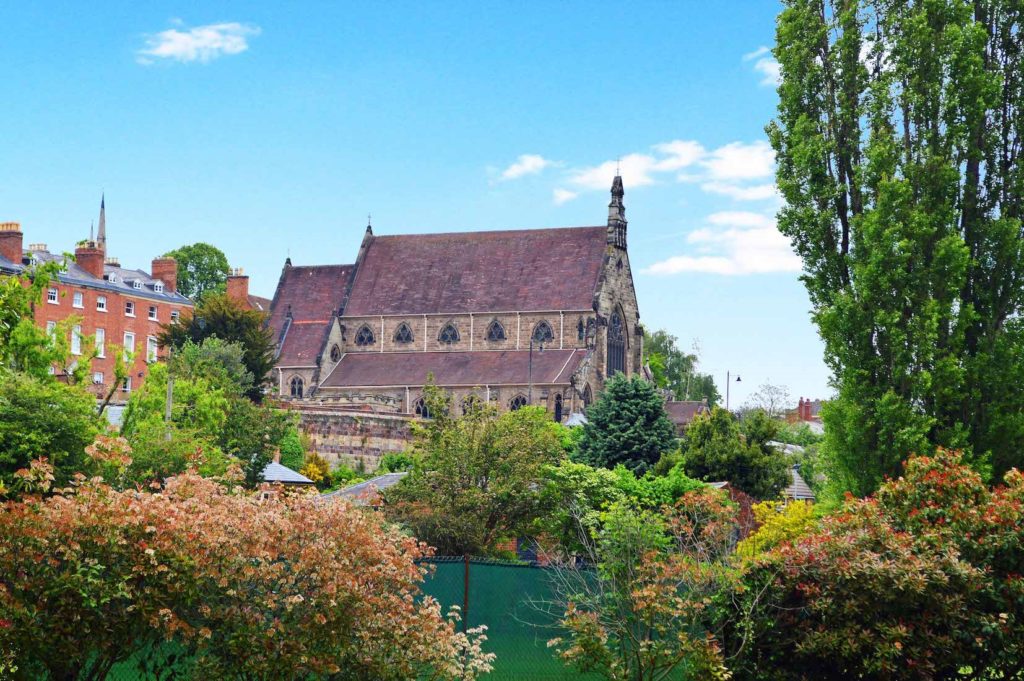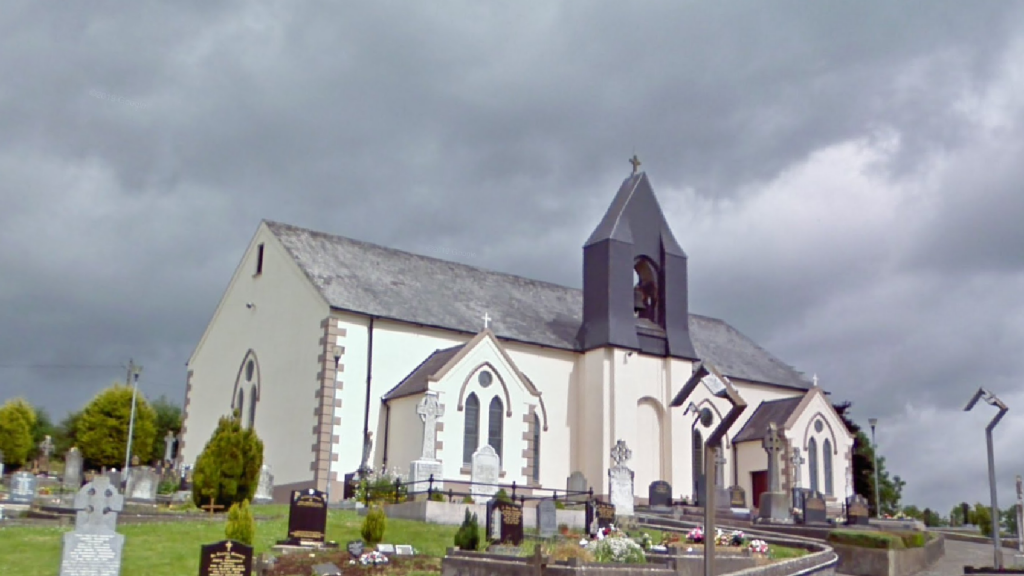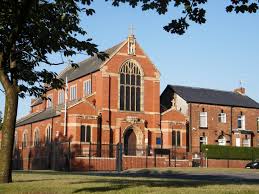Churches of the Day
Pictorial Thought for Today
Mar 4 - St Casimir (1458-84)
Patrick Duffy tells his story
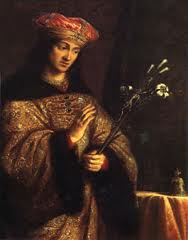 Although he lived in a world where he had to conform to the expectations of his father, Casimir was aware of other priorities - the love of God - and these were what he followed. In 1948 Pope Pius XII named him as patron saint of all youth.
Although he lived in a world where he had to conform to the expectations of his father, Casimir was aware of other priorities - the love of God - and these were what he followed. In 1948 Pope Pius XII named him as patron saint of all youth.A pious youth
Casimir born in 1458, was the second son of King Casimir IV of Poland. Tutored from childhood by a holy and modest man, Fr John Dlugosz of Cracow, the historian of Poland, he grew up as a devout and pious youth. When he was thirteen his father, at the request of one Hungarian faction, sent his son at the head of a large army to be king of Hungary, but at the border Casimir turned back and, to avoid his father's anger, went to do three months penance to the castle of Dobski near Cracow.
His preference for a life of religious retirement
Influenced again by Fr John Dlugosz, he was reluctant to take up arms especially against Christians who were being pressed by the Turks. He also refused to marry a daughter of Emperor Frederick III and preferred a life of celibacy, religious retirement and penance.
Viceroy of Poland
His elder brother, Ladislaus, had by now become king of Bohemia, so his father initiated him into public life and when in 1479 the king went to Lithuania for five years arranging affairs there, Casimir was viceroy of Poland, and from 1481 to 1483 administered the state with great prudence and justice. He promoted peace and the unity of Western Europe.
Died en route to Lithuania
He became ill with a lung disease, which may have been due to his fastings and mortification. While on a journey to Lithuania, he died at the court of Grodno, 4 March 1484. and was buried in the chapel of the Blessed Virgin in the cathedral of Vilna.
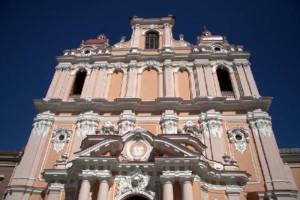
Veneration
After his death he was venerated as a saint, because of the miracles reported at his tomb. He was canonised in 1522 by Pope Adrian VI and was named patron saint of Poland and Lithuania in 1602.
In 1948 Pope Pius XII named him as patron saint of all youth.
____________________________________
******************************
Memorable Saying for Today
You will never find peace until
you are ready to commit yourself
to something worth dying for.
~ Jean Paul Sartre ~
******************************
Wednesday of the Second Week of Lent
Salvation comes from God alone. What he wants of us is to trust him,
for us to abandon ourselves to his merciful love and as our ultimate protection.
Saint of the Day: March 4th : St Casimir, peacemaker, Patron of Poland
C/f A short life of be this saint can found below todays' Readings and Reflection
FIRST READING,
A reading from the prophet Jeremiah 18:18-20
Come on, let us hit at him.
'Come on,' they said
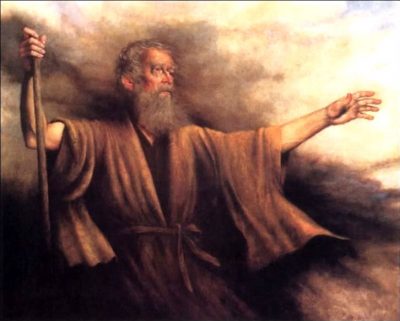 'let us concoct a plot against Jeremiah;
'let us concoct a plot against Jeremiah;the priest will not run short of instruction without him,
nor the sage of advice, nor the prophet of the word.
Come on, let us hit at him with his own tongue;
let us listen carefully to every word he says.'
"Listen to me, Lord, hear what my adversaries are saying.
Should evil be returned for good? For they are digging a pit for me.
Remember how I stood in your presence to plead on their behalf, to turn your wrath away from them."
The Word of the Lord. Thanks be to God
Responsorial Psalm Ps 30: 5-6, 14 ,15-16 R/v. 17
Response Save me in your love, O Lord.
1. Release me from the snares they have hidden for you are my refuge, Lord.
Into your hands I commend my spirit. It is you who will redeem me, Lord. Response
2. I have heard the slander of the crowd, fear is all around me,
as they plot together against me, as they plan to take my life. Response
3. But as for me, I trust in you, Lord, I say: 'You are my God.
My life is in your hands, deliver me from the hands of those who hate me.' Response
Gospel Acclamation Jn 6:63-68
Glory to you, O Christ, you are the Word of God!
Your words are spirit, Lord, and they are life;
you have the message of eternal life.
Glory to you, O Christ, you are the Word of God!
Or Jn 8:12
Glory to you, O Christ, you are the Word of God!
I am the light of the world, says the Lord,
anyone who follows me will have the light of life.
Glory to you, O Christ, you are the Word of God!
GOSPEL
The Lord be with you. And with your spirit
A reading from the holy Gospel according to Matthew 20:17-28 Glory to you, O Lord
They will condemn him to death.
Jesus was going up to Jerusalem, and on the way he took the Twelve to one side and said to them,
'Now we are going up to Jerusalem, and the Son of Man is about to be handed over to the chief priests and scribes. They will condemn him to death and will hand him over to the pagans to be mocked and scourged and crucified; and on the third day he will rise again.'
 Then the mother of Zebedee's sons came with her sons to make a request of him, and bowed low; and he said to her, 'What is it you want?'
Then the mother of Zebedee's sons came with her sons to make a request of him, and bowed low; and he said to her, 'What is it you want?'She said to him, 'Promise that these two sons of mine may sit one at your right hand and the other at your left in your kingdom.'
'You do not know what you are asking' Jesus answered.
'Can you drink the cup that I am going to drink?'
They replied, 'We can.'
'Very well,' he said 'you shall drink my cup, but as for seats at my right hand and my left, these are not mine to grant; they belong to those to whom they have been allotted by my Father.'
When the other ten heard this they were indignant with the two brothers.
But Jesus called them to him and said, 'You know that among the pagans the rulers lord it over them, and their great men make their authority felt. This is not to happen among you.
No; anyone who wants to be great among you must be your servant, and anyone who wants to be first among you must be your slave, just as the Son of Man came not to be served but to serve, and to give his life as a ransom for many.'
The Gospel of the Lord. Praise to you, Lord Jesus Christ
****************************************
Gospel Reflection Wednesday. Second Week of Lent Matthew 20:17-28
It is natural for mothers to want the best for their children. In today’s gospel reading, the mother of James and John ask Jesus if they could have the best seats in his kingdom, one at his right and the other at his left. Jesus had been proclaiming the nearness of the kingdom of God and she seems to have imagined that God’s kingdom would be like an earthly kingdom, such as the kingdom of Rome or the Roman Empire, as it is usually called. She wasn’t alone in thinking this. Her sons thought as much, along with the ten other members of the twelve. These ten were indignant with the two brothers for trying to get the best seats in God’s kingdom ahead of them. Jesus must have been rightly fed up with the lot of them!
He had just announced that his mission would lead to him being mocked, scourged and crucified. He would end up on a Roman cross with the mocking title over his head, ‘Jesus of Nazareth, king of the Jews’. Some king! It was his self-emptying love for all of God’s children, whether they were Jew, Samaritan or pagan, religious or sinner, that put him on a cross. The kingdom of God was present when he healed the sick, touched lepers, shared table with sinners, allowed women to wash his feet, fed the hungry in the wilderness, released the oppressed from their demons, even on the Sabbath. As he said at the end of the gospel reading, he had come not to be served, like the kings of this world, but to serve. If his disciples wanted to belong to God’s kingdom that is the mind-set they must have. If they want to be great they must become a servant. They can forget about honour and privilege. Whenever any one of us serve others without looking for anything in return, the kingdom of God is present in our world, and heaven draws nearer to everyone.
__________________
The Scripture Readings are taken from The Jerusalem Bible, published 1966 by Darton, Longman & Todd Ltd. and used with the permission of the publishers. http://dltbooks.com/
The Scripture Reflection is made available with our thanks from his book Reflections on the Weekday Readings : The Word is near to you, on your lips and in your heart by Martin Hogan and published by Messenger Publications c/f www.messenger.ie/bookshop/
___________________________________________
Saint of the Day: March 4th : St Casimir, peacemaker, Patron of Poland
Casimir, prince, peacemaker, born at Krakow (Poland) in 1458, died in Lithuania on this day in 1484. Though a young prince of Poland, he preferred peace to being a soldier. He chose celibacy over marriage and favoured prayer and penance rather than royal privilege. Noted for his generous life of austerity and devotion. Patron Saint of Poland.
Patrick Duffy tells his story
 Although he lived in a world where he had to conform to the expectations of his father, Casimir was aware of other priorities - the love of God - and these were what he followed. In 1948 Pope Pius XII named him as patron saint of all youth, Poland and Lithuania
Although he lived in a world where he had to conform to the expectations of his father, Casimir was aware of other priorities - the love of God - and these were what he followed. In 1948 Pope Pius XII named him as patron saint of all youth, Poland and LithuaniaA pious youth
Casimir born in 1458, was the second son of King Casimir IV of Poland. Tutored from childhood by a holy and modest man, Fr John Dlugosz of Cracow, the historian of Poland, he grew up as a devout and pious youth. When he was thirteen his father, at the request of one Hungarian faction, sent his son at the head of a large army to be king of Hungary, but at the border Casimir turned back and, to avoid his father's anger, went to do three months penance to the castle of Dobski near Cracow.
His preference for a life of religious retirement
Influenced again by Fr John Dlugosz, he was reluctant to take up arms especially against Christians who were being pressed by the Turks. He also refused to marry a daughter of Emperor Frederick III and preferred a life of celibacy, religious retirement and penance.
Viceroy of Poland
His elder brother, Ladislaus, had by now become king of Bohemia, so his father initiated him into public life and when in 1479 the king went to Lithuania for five years arranging affairs there, Casimir was viceroy of Poland, and from 1481 to 1483 administered the state with great prudence and justice. He promoted peace and the unity of Western Europe.

Died en route to Lithuania
He became ill with a lung disease, which may have been due to his fastings and mortification. While on a journey to Lithuania, he died at the court of Grodno, age 26, on March 4th, 1484. and was buried in the chapel of the Blessed Virgin in the Cathedral of Vilna.
Veneration
St-Casimir Church-Didzioji, Poland After his death he was venerated as a saint, because of the miracles reported at his tomb. He was canonised in 1522 by Pope Adrian VI and was named patron saint of Poland and Lithuania in 1602. In 1948 Pope Pius XII named him as patron saint of all youth.
____________________________________
******************************
Memorable Saying for Today
You will never find peace until
you are ready to commit yourself to something worth dying for.
~ Jean Paul Sartre ~
Sliocht as an fáidh Irimia 18:18-20
Tagaigí, buailimis é.
“Tagaigí,” a dúirt siad,
 “déanaimis cogar ceilge i gcoinne Irimia; ní bheidh ganntanas teagaisc ar an sagart dá uireasa, ná ní imeoidh comhairle ar an eagnaí, ná an briathar ar an bhfáidh. Téanaigí, buailimis é lena theanga féin; éistimis le gach focal dá dtagann as a bhéal.”
“déanaimis cogar ceilge i gcoinne Irimia; ní bheidh ganntanas teagaisc ar an sagart dá uireasa, ná ní imeoidh comhairle ar an eagnaí, ná an briathar ar an bhfáidh. Téanaigí, buailimis é lena theanga féin; éistimis le gach focal dá dtagann as a bhéal.”Tabhair cluas dom, a Thiarna, éist le céard tá á rá ag mo naimhde. Ar chuí ceart a chúiteamh le holc? (Mar tá siad ag tochailt poill do m’anam.)
Cuimhnigh gur sheas mé i d’fhianaise ag labhairt ar a son, le go n-iompóinn d’fhearg uathu.
Briathar an Tiarna Buíochas le Dia
Salm le Freagra Sm 30; 5-6, 14 ,15-16 R/v. 17
Freagra Slán mé i do ghrá, a Thiarna
1. Scaoil mé ón ngaiste a cuireadh i bhfearas romham, óir is tú mo dhídean, a Thiarna.
Do do láimhse a thiomnaím m’anam, óir is tú a cheannaigh mé a Thiarna. Freagra
2. Cluinim cogarnach á déanamh ag a lán, agus imeagla i mo thimpeall.
Cograíonn siad lena chéile i m’aghaidh: beartaíonn siad mo bhás. Freagra
3. Ach is ort atá mo sheasamh, a Thiarna, deirim: “Is tú mo Dhia.”
Tá m’anam ag brath ort, saor mé ón namhaid is ó chách ar mo thóir. Freagra
SOISCÉAL
Go raibh an Tiarna libh. Agus le do spiorad féin
Sliocht as an Soiscéal naofa de réir Naomh Matha 20:17-28 Glóir duit, a Thiarna.
Daorfaidh siad sin chun báis é.
San am sin bhí Íosa ag dul suas go Iarúsailéim, agus rug sé leis an dáréag ar leithligh agus sa tslí dóibh dúirt sé leo:
“Seo anois sinn ag dul suas go Iarúsailéim, agus tabharfar Mac an Duine ar láimh d’uachtaráin na sagart agus do na scríobhaithe, agus daorfaidh siad sin chun báis é, agus tabharfaidh siad ar láimh do na gintlithe é chun go ndéanfaí fonóid faoi agus go sciúrsálfaí é agus go gcéasfaí é, agus eireoidh sé an treas lá.”
 Ansin tháinig máthair chlann Zeibidé chuige agus a mic in éineacht léi agus d’umhlaigh sí síos ag iarraidh aisce air. Dúirt sé léi: “Cad ab áil leat?”
Ansin tháinig máthair chlann Zeibidé chuige agus a mic in éineacht léi agus d’umhlaigh sí síos ag iarraidh aisce air. Dúirt sé léi: “Cad ab áil leat?”“Tá,” ar sise leis, “an bheirt mhac seo agamsa, go n-ordófá iad a bheith ina suí, duine acu ar do dheis agus an duine eile ar do chlé, i do ríocht.”
D’fhreagair Íosa:
“Níl a fhios agaibh cad atá sibh a iarraidh,” ar seisean. “An bhféadann sibh an cupa a ól atá le hól agamsa?” Dúirt siad leis: “Féadaimid.”
Dúirt sé leo:
“Ólfaidh sibh go deimhin as mo chupa, ach maidir le suí ar mo dheis nó ar mo chlé, ní agamsa atá é sin a thabhairt ach is dóibh siúd é dá bhfuil sé i ndán ag m’Athair.”
Ar a chloisteáil sin don deichniúr, bhí míchéadfa acu ar an mbeirt dearthár. Ach ghlaoigh Íosa chuige iad agus dúirt:
“Tá a fhios agaibh go mbíonn prionsaí na ngintlithe ag tiarnú orthu, agus a gcuid uaisle ag smachtúchán orthu.
Ach ní mar sin a bheidh an scéal eadraibhse, ach an duine ar mian leis bheith ina uasal eadraibh, beidh sé ina sheirbhíseach daoibh, agus an duine ar mian leis bheith ina cheann oraibh, beidh sé ina sclábha daoibh; díreach faoi mar nár tháinig Mac an Duine chun go mbeifí ag freastal air ach chun go ndéanfadh sé féin freastal agus a anam a thabhairt mar cheannach ar mhórán."
Soiscéal an Tiarna. Moladh duit, a Chriost
AN BÍOBLA NAOFA
© An Sagart
Third Sunday of Lent, Year A
Through the Spirit of God the gift of love is poured into our hearts, a gift bought by the blood of Christ.
This is true for all Christians, new and old. But it needs to be constantly prayed for.
First Scrutiny of Catechumens is celebrated today
FIRST READING
A reading from the Book of Exodus 17:3-7
Give us water to drink.
 Tormented by thirst, the people complained against Moses. 'Why did you bring us out of Egypt?' they said. 'Was it so that I should die of thirst, my children too, and my cattle?' Moses appealed to the Lord. 'How am I to deal with this people? he said. 'A little more and they will stone me!'
Tormented by thirst, the people complained against Moses. 'Why did you bring us out of Egypt?' they said. 'Was it so that I should die of thirst, my children too, and my cattle?' Moses appealed to the Lord. 'How am I to deal with this people? he said. 'A little more and they will stone me!'The Lord said to Moses,
'Take with you some of the elders of Israel and move on to the forefront of the people; take in your hand the staff with which you struck the river, and go. I shall be standing before you there on the rock, at Horeb. You must strike the rock, and water will flow from it for the people to drink.'
This is what Moses did, in the sight of the elders of Israel. The place was named Massah and Meribah because of the grumbling of the sons of Israel and because they put the Lord to the test by saying, 'Is the Lord with us, or not?'
The Word of the Lord Thanks be to God.
Responsorual Psalm Ps 94:1-2, 6-9, R/v8
Response O that today you would listen to his voice,
harden not your hearts.
1. Come, ring out our joy to the Lord; hail the rock who saves us.
Let us come before him, giving thanks, with songs let us hail the Lord. Response
2. Come in; let us bow and bend low; let us kneel before the God who made us
for he is our God and we the people who belong to his pasture,
the flock that is led by his hand. Response
3. O that today you would listen to his voice! 'Harden not your hearts as at Meribah,
as on that day at Massah in the desert when your fathers put me to the test;
when they tried me, though they saw my work.' Response
SECOND READING
A reading from the first letter of St Paul to the Romans 5:1-2. 5-8
The love of God has been poured into our hearts by the Holy Spirit which has been given us.
 Through our Lord Jesus Christ, by faith we are judged righteous and at peace with God, since it is by faith and through Jesus that we have entered this state of grace in which we can boast about looking forward to God's glory and this hope is not deceptive, because the love of God has been poured into our hearts by the Holy Spirit which has been given us. We were still helpless when at his appointed moment Christ died for sinful men. It is not easy to die even for a good man - though of course for someone really worthy, a man might be prepared to die - but what proves that God loves us is that Christ died for us while we were still sinners.
Through our Lord Jesus Christ, by faith we are judged righteous and at peace with God, since it is by faith and through Jesus that we have entered this state of grace in which we can boast about looking forward to God's glory and this hope is not deceptive, because the love of God has been poured into our hearts by the Holy Spirit which has been given us. We were still helpless when at his appointed moment Christ died for sinful men. It is not easy to die even for a good man - though of course for someone really worthy, a man might be prepared to die - but what proves that God loves us is that Christ died for us while we were still sinners.The Word of the Lord Thanks be to God.
Gospel Acclamation Jn 4: 42.15
Glory and praise to you, O Christ !
Lord, you are really the saviour of the world;
give me the living water, so that I may never get thirsty.
Glory and praise to you, O Christ !
GOSPEL
The Lord be with you. And with your spirit
A reading from the Gospel according to John 4:5-42 Glory to you, O Lord
A spring inside him, welling up to eternal life'
Jesus came to the Samaritan town called Sychar, near the land that Jacob gave to his son Joseph. Jacob's well is there and Jesus, tired by the journey, sat straight down by the well. It was about the sixth hour When a Samaritan woman came to draw water,
Jesus said to her, 'Give me a drink'.
His disciples had gone into the town to buy food. The Samaritan woman said to him,
'What? You are a Jew and you ask me, a Samaritan, for a drink?' - Jews, in fact, do not associate with Samaritans.
Jesus replied:
 If you only knew what God is offering and who it is that is saying to you: Give me a drink, you would have been the one to ask, and he would have given you living water'.
If you only knew what God is offering and who it is that is saying to you: Give me a drink, you would have been the one to ask, and he would have given you living water'.'You have no bucket, sir,' she answered 'and the well is deep: how could you get this living water? Are you a greater man than our father Jacob who gave us this well and drank from it himself with his sons and his cattle?'
Jesus replied 'Whoever drinks this water will get thirsty again;
but anyone who drinks the water that I shall give will never be thirsty again: the water that I shall give will turn into a spring inside him, welling up to eternal life'.
'Sir,' said the woman 'give me some of that water, so that I may never get thirsty and never have to come here again to draw water.'
'Go and call your husband' said Jesus to her 'and come back here.'
The woman answered, 'I have no husband'.
He said to her, You are right to say, "I have no husband"; for although you have had five, the one you have now is not your husband. You spoke the truth there.'
'I see you are a prophet, sir' said the woman.
'Our fathers worshipped on this mountain, while you say that Jerusalem is the place where one ought to worship.'
Jesus said: 'Believe me, woman, the hour is coming when you will worship the Father neither on this mountain nor in Jerusalem. You worship what you do not know; we worship what we do know: for salvation comes from the Jews.
But the hour will come - in fact it is here already – when true worshippers will worship the Father in spirit and truth: that is the kind of worshipper the Father wants. God is spirit, and those who worship must worship in spirit and truth.'
The woman said to him, 'I know that Messiah - that is, Christ - is coming; and when he comes he will tell us everything'.
'I who am speaking to you,' said Jesus 'I am he.'
At this point his disciples returned, and were surprised to find him speaking to a woman, though none of them asked, 'What do you want from her?' or, 'Why are you talking to her?'
The woman put down her water jar and hurried back to the town to tell the people.
'Come and see a man who has told me everything I ever did; I wonder if he is the Christ?' This brought people out of the town and they started walking towards him.
Meanwhile, the disciples were urging him, 'Rabbi, do have something to eat; but he said,
'I have food to eat that you do not know about'.
So the disciples asked one another, 'Has someone been bringing him food?'
But Jesus said: 'My food is to do the will of the one who sent me, and to complete his work.
Have you not got a saying: 'Four months and then the harvest?'
Well, I tell you: Look around you, look at the fields; already they are white, ready for harvest!
Already the reaper is being paid his wages, already he is bringing in the grain for eternal life,
and thus sower and reaper rejoice together.
For here the proverb holds good: one sows, another reaps; I sent you to reap a harvest you had not worked for. Others worked for it; and you have come into the rewards of their trouble.'
Many Samaritans of that town had believed in him on the strength of the woman's testimony when she said, 'He told me all I have ever done', so, when the Samaritans came up to him, they begged him to stay with them. He stayed for two days, and when he spoke to them many more came to believe; and they said to the woman, 'Now we no longer believe because of what you told us; we have heard him ourselves and we know that he really is the saviour of the world'.
The Gospel of the Lord Praise to you, Lord Jesus Christ.
*****************************
For homily resources for this Sunday's Gospel click here: https://www.catholicireland.net/sunday-homily/
The scripture readings are taken from THE JERUSALEM BIBLE, published in 1966 by Darton, Longman and Todd Ltd and used with permission of the publishers.
Sliocht as Leabhar Exodus 17:3-7
Tabhair dúinn uisce le hól.
 Bhí íota tarta ar an bpobal agus rinneadar monabhar in aghaidh Mhaois.
Bhí íota tarta ar an bpobal agus rinneadar monabhar in aghaidh Mhaois.“Cad chuige ar thug tú amach as an Éigipt sinn?” ar siad.
“An d’fhonn go gcuirfeá sinn féin agus ár gclann agus ár stoc chun báis le tart?”
Ghlaoigh Maois ar an Tiarna: “Cad a dhéanfaidh mé leis an bpobal seo? Is beag nach bhfuil siad ag gabháil de chlocha ionam.”
Agus dúirt an Tiarna le Maois:
“Tabhair leat cuid de sheanóirí Iosrael agus téigh ar thosach an phobail. Beir i do láimh ar an tslat lenar bhuail tú an abhainn, agus seo leat. Féach! beidh mé i mo sheasamh ansiúd ar an gcarraig romhat (i Horaeb). Buail an charraig agus snífidh uisce aisti le hól ag an bpobal.”
Agus rinne Maois amhlaidh i láthair sheanóirí Iosrael. Thug sé Masá agus Miríbeá ar an áit de bharr chasaoid chlann Iosrael agus go ndearnadar promhadh ar an Tiarna á rá: “An bhfuil an Tiarna farainn nó nach bhfuil?”
Briathar an Tiarna Buíochas le Dia
Salm le Freagra Sm 94:1-2, 6-9, R/v8
Freagra Á, dá n-éistfeadh sibh lena ghuth inniu: 'Ná calcaigí bhur gcroí.'
1. Tagaigí, déanaimis gairdeas don Tiarna, tógaimis gártha áthais do Charraig ár slánaithe.
Tagaimis ina láthair le moltaí, déanaimis gairdeas dó le laoithe. Freagra
2. Tagaigí, adhraimis agus sléachtaimis, feacaimis ár nglúine don Tiarna a rinne sinn.
Óir is é ár nDia é, agus is sinne pobal a aoireachta agus caoirigh a lámh. Freagra
3. Á, dá n-éistfeadh sibh lena ghuth inniu: 'Na calcaigí bhur gcroí mar a tharla i Meríba,
mar a tharla an lá úd ag Masá san fhásach mar ar chuir bhur n-aithreacha cath orm,
mar ar thriail siad mé cé go bhfaca siad m'obair.' Freagra
DARA LÉACHT
Sliocht as Litir Naomh Pól chuig na Rómhánaigh 5:1-2. 5-8
Tá ár gcroí líonta de ghrá Dé tríd an Spiorad Naomh a tugadh dúinn
 Dá bhrí sin, ó táimid fíréanaithe ag an gcreideamh, tá síocháin againn le Dia trínár dTiarna Íosa Críost, mar is trídsean atá teacht againn le creideamh ar an ngrásta seo ina mairimid. Agus ábhar mórála dúinn is ea an dóchas go bhfuil glóir Dé i ndán dúinn. Agus ní amháin sin ach is ábhar mórála dúinn ár dtrioblóidí agus a fhios againn go dtagann foighne ón trioblóid, agus diongbháilteacht ón bhfoighne agus dóchas ón diongbháilteacht. Ní chliseann an dóchas seo orainn mar tá ár gcroí líonta de ghrá Dé tríd an Spiorad Naomh a tugadh dúinn. Nuair a bhíomar fós lag, fuair Críost bás i dtráth ar son drochdhaoine. Is ar éigean a gheobhadh fear bás ar son duine chóir féin – is ea, b’fhéidir go mbeadh sé de chroí aige bás a fháil ar son dea-dhuine. Ach cruthaíonn Dia an grá atá aige dúinn trí Chríost a fháil bháis ar ár son agus sinn fós inár bpeacaigh.
Dá bhrí sin, ó táimid fíréanaithe ag an gcreideamh, tá síocháin againn le Dia trínár dTiarna Íosa Críost, mar is trídsean atá teacht againn le creideamh ar an ngrásta seo ina mairimid. Agus ábhar mórála dúinn is ea an dóchas go bhfuil glóir Dé i ndán dúinn. Agus ní amháin sin ach is ábhar mórála dúinn ár dtrioblóidí agus a fhios againn go dtagann foighne ón trioblóid, agus diongbháilteacht ón bhfoighne agus dóchas ón diongbháilteacht. Ní chliseann an dóchas seo orainn mar tá ár gcroí líonta de ghrá Dé tríd an Spiorad Naomh a tugadh dúinn. Nuair a bhíomar fós lag, fuair Críost bás i dtráth ar son drochdhaoine. Is ar éigean a gheobhadh fear bás ar son duine chóir féin – is ea, b’fhéidir go mbeadh sé de chroí aige bás a fháil ar son dea-dhuine. Ach cruthaíonn Dia an grá atá aige dúinn trí Chríost a fháil bháis ar ár son agus sinn fós inár bpeacaigh.Briathar an Tiarna Buíochas le Dia
Comhghair an tSoisceil Eo 4:42, 15
A Thiarna, is tú dáiríre Slánaitheoir an tsaoil;
tabhair dom on t-uisce beo i dtreo nach mbeidh tart orm choíche.
SOISCÉAL
Sliocht as Soiscéal naofa de réir Naomh Eoin 4:5-42
Tobar uisce ag brúchtail chun na beatha síoraí.
San am sin tháinig Íosa mar sin go cathair sa tSamáir darbh ainm Suchar, láimh leis an bhfearann a thug Iacób dá mhac Iósaef. Ansiúd a bhí tobar Iacóib. Mar go raibh Íosa traochta ón aistear, shuigh sé ag an tobar. Timpeall an séú huair a ba ea é. Tháinig bean ón tSamáir ag tarraingt uisce.
Dúirt Íosa léi: “Tabhair dom deoch.” Bhí a dheisceabail imithe isteach don chathair ag ceannach bia. Dúirt an Samárach mná leis ansin: “Conas go n-iarrann tusa, agus gur Giúdach thú, deoch ormsa agus gur Samárach mná mé?” Ní bhíonn aon chaidreamh ag Giúdaigh ar Shamáraigh.

D’fhreagair Íosa: “Dá mba eol duit tabhartas Dé,” ar sé léi,“agus cé hé a deir leat:
‘ Tabhair dom deoch,’ is tusa a bheadh ag iarraidh airsean, agus thabharfadh sé duit uisce beo.”
“Níl aon bhuicéad agat, a dhuine uasail,” arsa an bhean leis, “agus tá an tobar domhain. Cad as mar sin a gheobhfá an t-uisce beo seo? An amhlaidh gur mó thú ná ár n-athair Iacób a thug dúinn an tobar agus gur ól sé féin as agus a chlann agus a thréada?”
D’fhreagair Íosa:
“Gach duine a ólann an t-uisce seo,” ar sé léi, “beidh tart arís air. Ach má olann aon duine an t-uisce a thabharfaidh mise dó, ní bheidh tart air go brách na breithe. Ach an t-uisce a thabharfaidh mise dó, déanfaidh tobar uisce de istigh ann, ag brúchtaíl chun na beathn síoraí.”
Dúirt an bhean leis:
“A dhuine uasail, tabhair dom an t-uisce sin i dtreo nach mbeidh tart orm choíche, agus nach gcaithfidh mé teacht anseo ag tarraingt uisce.”
Dúirt sé léi: “Imigh agus glaoigh ar d’fhear agus fill anseo.”
D’fhreagair an bhean: “Níl fear agam,”
Dúirt Íosa léi: “Is maith a dúirt tú: ‘Níl fear agam’; óir bhí cúigear fear agat agus an té atá anois agat ní hé d’fhear é. D’inis tú an fhírinne sa mhéid sin.”
Dúirt an bhean leis: “A dhuine uasail, feicim gur fáidh thú. Ar an gcnoc seo a rinne ár n-aithreacha Dia a adhradh, ach deir sibhse gur in Iarúsailéim atá an áit in ar cóir adhradh a dhéanamh.”
Dúirt Íosa léi: “Creid uaimse é, a bhean go bhfuil an uain ag teacht nuair nach ar an gcnoc seo ná in Iarúsailéim a dhéanfaidh sibh an tAthair a adhradh. Adhrann sibhse an ní nach eol daoibh; adhraimidne an ní is eol dúinn; mar is ó na Giúdaigh an slánú.
Ach tá an uain ag teacht, agus is anois féin é, ina ndéanfaidh lucht an fhíoradhartha an tAthair a adhradh sa Spiorad agus san fhírinne; óir sin iad an sórt is mian leis an Athair á adhradh. Spiorad é Dia, agus lucht a adhartha is i spiorad agus i bhfírinne a chaithfidh siad adhradh.”
Dúirt an bhean leis: “Tá a fhios agam go bhfuil an Meisias ag teacht” – is é sin le rá an Críost – “agus nuair a thiocfaidh seisean inseoidh sé gach aon ní dúinn.”
Dúirt Íosa léi: “Mise é atá ag caint leat.”
Lena linn sin tháinig a dheisceabail agus rinne siad ionadh de go raibh sé ag caint le bean. Ní dúirt aon duine acu, áfach: “Cad tá uait?” ná “Cén fáth tú a bheith ag caint léi?”
Lig an bhean a crúsca uaithi ansin agus d’imigh léi isteach don chathair agus dúirt leis na daoine:
“Tagaigí go bhfeicfidh sibh fear a d’inis dom gach ní dá ndearna mé. An féidir gurb é an Criost é?”
Ghluais deoine amach as an gcathair agus bhí siad ag dul ina threo.
Lena linn sin bhí a dheisceabail ag tathant air: “A raibí,” ar siad leis, “bí ag ithe.”
Dúirt sé leo: “Tá agam bia le hithe nach eol daoibhse.”
Ansin dúirt na deisceabail lena chéile: “An féidir gur thug duine éigin rud le hithe dó?”
Dúirt Íosa leo “Is é is bia domsa toil an té a chuir uaidh mé a dhéanamh agus a obair a chur i gcrích.
Nach ndeir sibhse ‘Ceithre mhí eile agus beidh an fómhar ann’?
Seo mise á rá libh: Tógaigí bhur súile agus féachaigí ar na goirt; tá siad geal chun an fhómhair.
Tá a thuarastal á fháil ag an mbuanaí cheana féin, agus tá toradh á bhailiú aige chun na beatha síoraí, i dtreo go bhfuil lúcháir ar an síoladóir agus ar an mbuanaí in éineacht.
Óir is fíor don seanfhocal sa mhéid seo: ‘ Cuireann duine, baineann duine eile.’ Sheol mise sibhse uaim chun fómhar a bhaint nár shaothraigh sibh féin. Shaothraigh daoine eile é, agus chuaigh sibhse isteach ina saothar.”
Chreid a lán de Shamáraigh na cathrach sin ann de bharr fhocal na mná ag tabhairt na fianaise: “D’inis sé dom gach ní dá ndearna mé.”
Nuair a tháinig na Samáraigh chuige dá bhrí sin bhí siad ag tathant air fanacht faróthu, agus d’fhan sé ansiúd dhá lá. Ba mhó go mór a chreid de bharr a bhriathair agus deiridís leis an mbean:
“Ní mar gheall ar do chuid cainte a chreidimid a thuilleadh; óir chualamar féin é agus tá a fhios againn gurb é seo dáiríre Slánaitheoir an domhain.”
Soiscéal an Tiarna. Moladh duit, a Chriost
AN BÍOBLA NAOFA
© An Sagart


